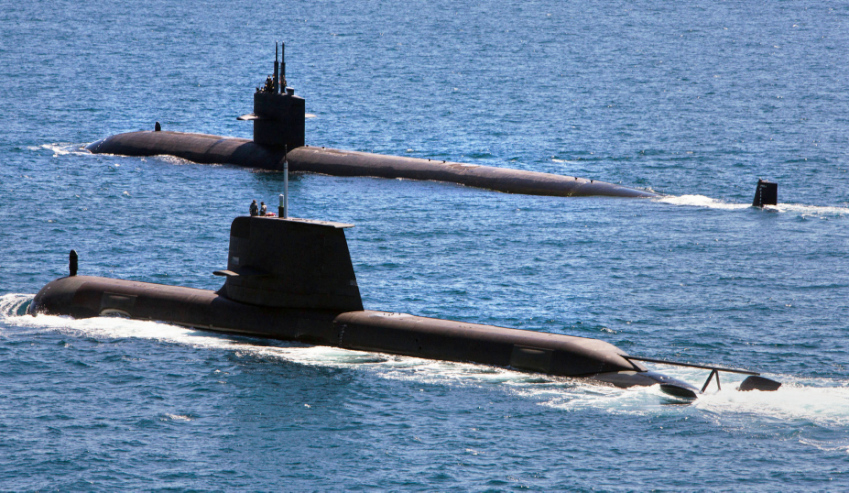A Victorian defence organisation has praised the efforts of Victorian, South Australian and West Australian state ministers in uniting and calling for stronger commitments on Australian industry involvement.
To continue reading the rest of this article, please log in.
Create free account to get unlimited news articles and more!
As reported on Defence Connect, South Australia's Minister for Defence Industries Martin Hamilton-Smith, Victoria's Minister for Industry and Employment Wade Noonan and Western Australia's Minister for Defence Issues Paul Papalia have joined forces to address their concerns about the Future Submarine Program (FSP), Australia's largest ever defence acquisition.
The ministers wrote a letter to the Senate economics committee to call for tougher contractual obligations on the prime contractors for the Future Submarine Program.
The Australian Industry & Defence Network-Victoria (AIDN-Vic) has welcomed and supported the stand taken by the ministers, a move which AIDN-Vic president Stephen Harvey said is positive advocacy for Victoria's defence sector.
"Victoria has a diverse and capable defence industry sector, with both large-scale operations and many small to medium enterprises that have significant capabilities aligned with the submarine and other major defence programs," Harvey said.
"The federal government has committed to building a regionally superior submarine fleet. This is a significant aspiration, but needs to be supported by firm commitments from the federal government – and Defence – to technology transfer and the development of Australian supply chains to underpin the fulfilment of prime contracts with major multinational firms and to build the necessary sovereign industrial capability required to maintain and enhance our regional superiority."
Through the Victorian Defence Alliances, AIDN-Vic has already hosted industry briefings from contractors like Naval Group (formerly DCNS), and the organisation said it is ready to continue to assist Naval Group, Lockheed Martin and other major contractors in further and more meaningful engagements with the sector in the future.
AIDN-Vic is endorsed and actively supported by the state government of Victoria through the Department of Economic Development, Jobs, Transport and Resources, which has assisted the network with funding to undertake marketing initiatives and provide comprehensive member services. The Victorian government also provides funding support for the Victorian Defence Alliances, managed through AIDN.
The letter penned by the ministers included eight policy approaches:
1. The prime contractors for the future submarine program, Naval Group and Lockheed Martin, must be contractually obliged to work with the Department of Defence to optimise Australian industry involvement in this program. Consideration must be given to the establishment of a minimum level of Australian industry participation by value of the contract entered into. It is noted that the Minister for Defence Industy Christopher Pyne has publicly confirmed the government's expectation of high levels of Australian industry involvement.
2. Contracts with Naval Group and Lockheed Martin should mandate minimum Australian industry involvement by value for each stage of the program, and an overall program benchmark should be a minimum of 60 per cent. This should be informed by the identification of components of work that can be undertaken by Australians, and the identification of organisations that have the capability or potential capability to perform the work.
3. A contractual obligation should stipulate that Australian organisations must receive, apply and develop the technology and know-how from Naval Group and Lockheed Martin, subject to appropriate national security, commercial and intellectual property arrangements.
4. The contracts with Naval Group and Lockheed Martin should oblige the prime contractors to work with relevant organisations that have knowledge of and contact with Australian defence industry companies and their capabilities, and which can provide a clearinghouse role for the primes to access local industry. Contractual incentives should be considered to further maximise local work.
5. The same approach should be adopted in relation to the research and scientific endeavour to develop and support the submarines. It is in the national interest that knowledge is transferred from overseas and embedded in the Australian research community in order to develop, construct and maintain the submarines, and its design and technological evolution, in the decades ahead.
6. Naval Group and Lockheed Martin should be contractually obliged to establish a clearinghouse in conjunction with the Defence Science and Technology Group for access to Australian research and development knowledge as portals for accessing the appropriate expertise in the Australian scientific community.
7. To reinforce the strategic and economic importance of Australian industry involvement in the program, the Commonwealth government should require that an Australian citizen be chairman of Naval Group Australia. A minimum number of Australian citizens on the board should also be stipulated.
8. A target year should be set for an all-Australian workforce working on the construction and maintenance of Australian submarines.

 Login
Login







